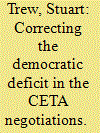|
|
|
Sort Order |
|
|
|
Items / Page
|
|
|
|
|
|
|
| Srl | Item |
| 1 |
ID:
124728


|
|
|
|
|
| Publication |
2013.
|
| Summary/Abstract |
The federal government claims that the Canada-EU Comprehensive Economic and Trade Agreement (CETA) negotiations have been the most transparent and participatory in Canadian history. Labour, environmental, social justice, and other civil society groups that are critical of the proposed agreement for various reasons would argue that their perspectives have been excluded from the official federal dialogue. This article looks at some of the efforts of non-governmental (civil society) actors, and in particular the Trade Justice Network and its member organizations, to affect the CETA negotiations in other ways, with an emphasis on contact with provincial governments, municipalities, European decision makers, and other non-governmental groups in Canada and Europe. It is argued that the exclusion of critical views shows an inherent democratic deficit in the CETA negotiations that privileges corporate insiders at the expense of civil society, the public, and even elected officials. Notwithstanding this deficit, the success of the civil society campaigns can be seen in the problem areas delaying a successful conclusion of negotiations, including new public procurement restrictions for Canadian municipalities and pharmaceutical patent term extensions. For the Trade Justice Network, these areas also help explain how the agreement narrows the fields of economic, environmental, and social governance in Canada.
|
|
|
|
|
|
|
|
|
|
|
|
|
|
|
|
| 2 |
ID:
087611


|
|
|
|
|
| Publication |
2009.
|
| Summary/Abstract |
In The Israel Lobby and U.S. Foreign Policy, we argued that the "special relationship" between the United States and Israel is due largely to the influence of a domestic interest group-comprised of Jews as well as non-Jews-and that this unusual situation is harmful to both the United States and Israel. Jerome Slater's thoughtful review endorses many of our central arguments, but it also highlights several points of disagreement. He argues that we overlooked important alternative sources, defined the lobby too broadly, and exaggerated its influence on Congress and especially the Executive Branch. Although Slater is even more critical of U.S. Middle East policy than we are, he argues that the special relationship is due to strong cultural and religious affinities and broad public support in American society, and not to the influence of the lobby. In fact, the alternative sources cited by Slater do not undermine our basic claims; a broad conception of the lobby makes more sense than his narrower definition; and there is little disagreement between us about the lobby's influence on Capitol Hill or in the White House. Most importantly, public opinion in the United States does not explain why the United States gives Israel such extensive and nearly unconditional backing. Although most Americans have a favorable image of Israel, surveys show that they also favor a more even-handed Middle East policy and a more normal relationship with Israel. Thus, the special relationship is due primarily to the lobby's influence, and not to the American people's enduring identification with the Jewish state.
|
|
|
|
|
|
|
|
|
|
|
|
|
|
|
|
|
|
|
|
|